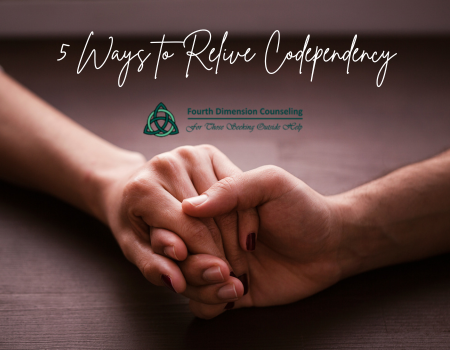Codependency, a pattern of unhealthy behaviors in relationships where one person relies excessively on another for approval, identity, and a sense of self-worth, can be emotionally draining and detrimental to personal well-being. Recognizing and addressing codependency is a crucial step toward fostering healthier relationships and cultivating a stronger sense of self. In this article, we explore five effective ways to relieve codependency and embark on a journey of personal growth and empowerment.
5 Ways to Relieve Codependency
1.  Self-Awareness and Reflection:
Self-Awareness and Reflection:
- Start by examining your own emotions and motivations in relationships. Ask yourself if you find your self-worth solely dependent on the opinions and reactions of others. Consider the roots of these patterns—whether they stem from past experiences, upbringing, or societal influences. Seeking the assistance of a therapist can provide a supportive and objective perspective, guiding you through the process of self-discovery.
- Journaling is a powerful tool for self-reflection. Take note of your thoughts, feelings, and behaviors in various situations, especially those involving relationships. Identify any recurring themes or triggers. This practice can help you gain clarity on your emotional responses and unveil patterns that may contribute to codependent tendencies.
- Mindfulness practices, such as meditation and deep breathing exercises, can aid in staying present and attuned to your emotions, allowing you to break free from codependency. Mindfulness fosters a non-judgmental awareness of your thoughts and actions, enabling you to respond consciously rather than reactively in relationships.
2. Establishing Boundaries:
- Clearly define your personal boundaries by identifying what behaviors, comments, or actions are acceptable and unacceptable to you. Communicate these boundaries assertively but respectfully to those around you. Remember, setting boundaries is not about controlling others; it’s about creating a healthy space for yourself.
- Practice saying “no” without guilt. As a codependent individual, the fear of rejection or disappointing others may make it challenging to decline requests or set limits. Learning to say “no” is empowering and allows you to prioritize your own needs and well-being.
- Be consistent in upholding your boundaries. It’s essential to enforce the limits you’ve set, even if it feels uncomfortable initially. Consistency sends a clear message to others about your expectations and reinforces your commitment to maintaining a healthy and balanced relationship dynamic.
3. Cultivating Self-Compassion:
- Challenge negative self-talk by consciously replacing critical thoughts with affirmations. Your achievements should be acknowledged and celebrated, and it does not matter how seemingly small they may be. Developing a positive inner dialogue is crucial in building self-compassion and breaking free from the cycle of seeking external validation/codependency.
- Practice self-care regularly. Get involved in activities that make you feel relaxed, joyous, and fulfilled. Whether it’s reading, taking a nature walk, or pursuing a hobby, dedicating time to self-nurturing activities reinforces the idea that your well-being is a priority.
- Embrace imperfection as a part of the human experience. It is important to note that making mistakes does not make you any less worthy. Learn from experiences, and view challenges as opportunities for growth rather than as reflections of personal failure.
4. Building a Support System:
- Share your journey with friends or family members who are understanding and empathetic. Open up about your struggles and goals, and welcome their support and encouragement. Having a reliable support system provides a safety net as you navigate the complexities of breaking free from codependency.
- Consider seeking therapy from professionals, or becoming a member of support groups. Connecting with individuals who have faced similar challenges offers insights, validation, and a sense of shared experience. Therapists can provide guidance tailored to your specific situation and help you develop effective coping mechanisms.
- Be proactive in seeking feedback and advice from your support system. Constructive input can offer alternative perspectives and valuable insights, aiding in your personal development and journey toward healthier relationships.
5. Investing in Personal Growth:
- Set realistic and achievable personal goals. Break down large tasks or objectives into smaller steps that you can manage easily. Celebrate your progress along the way, reinforcing a positive self-image and fostering a sense of accomplishment.
- Explore new interests and activities that align with your passions. This not only broadens your horizons but also enhances your sense of self outside of relationships. Rediscovering or developing hobbies contributes to a more enriched and fulfilling life.
- Consider pursuing education or skill development. Investing in your personal and professional growth not only boosts your confidence but also expands your sense of identity and purpose. The journey toward breaking free from codependency involves continuous learning and self-improvement.
Breaking free from codependency is a transformative process that requires self-awareness, commitment, and a willingness to embrace change. By establishing boundaries, cultivating self-compassion, building a support system, and investing in personal growth, individuals can liberate themselves from the patterns of unhealthy dependence on others. Remember that the journey toward healthier relationships and a more fulfilling life is ongoing, and each step taken toward relieving codependency brings you closer to a future characterized by independence, self-love, and genuine connection.
